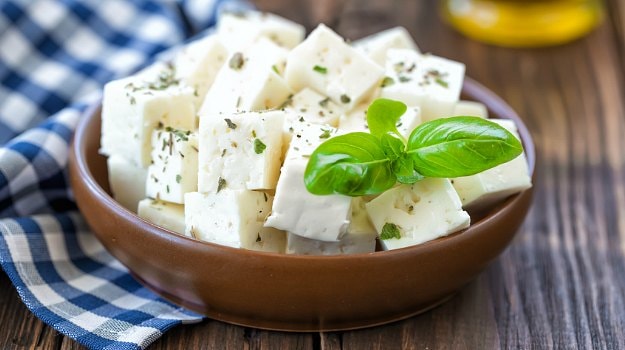What is Feta Cheese?Feta cheese is a brined curd cheese made from Sheep's milk. Originally hailing from Greece, Feta is Greek means "slice", Feta is packaged and sold in blocks. The crumbly bright coloured cheese is also made with a mixture of sheep and goat's milk. Origins of Feta could be traced back to 8th Century B.C Greece. Homer's Odyssey, in the section of Polyphemus's cave, speaks in length about churning cheese out of goats milk. Making cheese out of goat's milk was a popular tradition in Greek villages, locals would employ various techniques and technologies to do so. Traditionally and legally within Europe, feta is produced using only whole sheep's milk, or a blend of sheep's and goat's and sometimes cow's milk. The legal limit is maximum of 30% goat's milk. Most producers have now started using pasteurized milk which has a little salty and tangy flavor. The grainy, aged cheese is popularly used in salads, pastries, omelettes, sandwiches or as a garnish on meat and vegetable preparations. Feta is often touted to be a healthier cheese as compared to its other counterparts made wholly of cow's milk.
 Feta is packaged and sold in blocksHere are the benefits of the white crumbly cheese that would convince you to add Feta to your diet.
Feta is packaged and sold in blocksHere are the benefits of the white crumbly cheese that would convince you to add Feta to your diet.1. Easier to digest: Consultant nutritionist Dr. Rupali Dutta says that Feta is much easier to digest and is much less allergenic and anti-inflammatory, hence good for people who are slightly allergic to dairy.
2. Lower fat content: Swap your cheddars and Parmesan with Feta cheese. Feta cheese is lower in fat and calories as compared to many other types of cheese. Feta cheese has 21 grams of fat (per 100 grams) as per USDA. Cheddar on the other hand has 33 grams, while Parmesan has 29 grams of total fats, most of them saturated.
3. Good source of Protein: In addition to good fats and calcium, Feta can also prove to be a good source of protein. Dr. Rupali says, "Feta is a good source of protein Histadine which is immensely beneficial for muscles."

4. Good source of Vitamins: Feta could also be a valuable addition to your diet if you are looking to load up on vitamins from other sources than fruits. Dr. Rupali says, " Feta is rich in Vitamin B6, Vitamin A, and Phosphorous."
5. Excellent Probiotic: Feta could do wonders for your gut health. Feta contains numerous probiotics such as Lactobacillus casei, L. paracasei, L. plantarum, L. rhamnosus, L. coryneformis, Lactobacillus curvatus, L. brevis, and the likes which are good for overall health too.
6. Good for bone health: Made of goat milk, feta is one of the most healthy sources of calcium, calcium and potassium, Feta like every dairy product can improve the bone health significantly, says Health Practitioner and Macrobiotic Nutritionist Shilpa Arora.

While the grainy, salty cheese can be enjoyed as part of salads, sandwiches or whole wheat parathas, says Shilpa, it can also be eaten alone with some olive oil or olives and sprinkled with aromatic herbs such as oregano. But make sure you don't go overboard with your Feta intake. Excess of anything is bad. The sodium content in Feta may trigger your blood cholesterol levels, when taken in excess.
About Sushmita SenguptaSharing a strong penchant for food, Sushmita loves all things good, cheesy and greasy. Her other favourite pastime activities other than discussing food includes, reading, watching movies and binge-watching TV shows.








